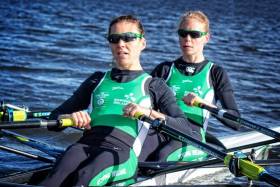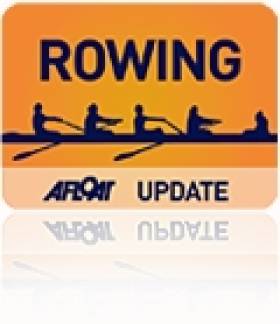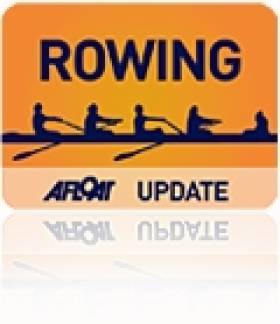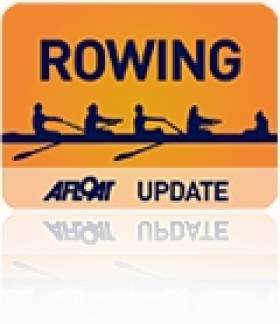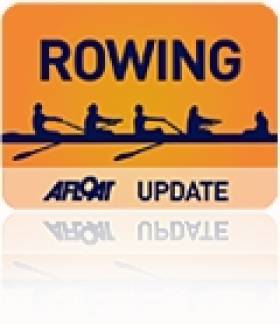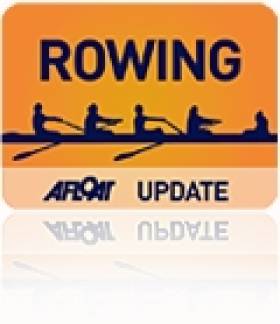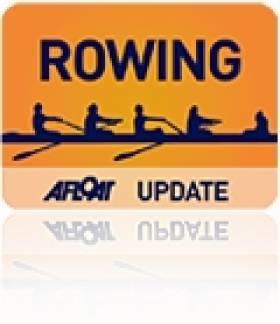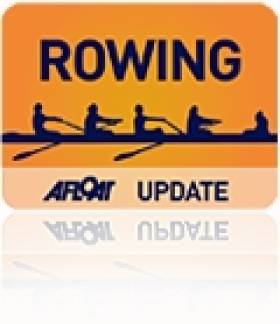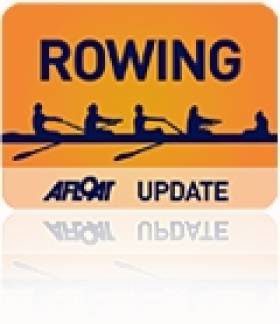Displaying items by tag: Kennedy
Jennings and Lambe Win C Final at World Cup in Varese
#Rowing: Sinéad Jennings and Claire Lambe ended their campaign at the World Cup Regatta in Varese with a commanding performance to win the C Final of the lightweight double sculls. They led all the way and were four lengths clear of nearest rivals, Italy Three, at the finish.
Ireland had two competitors in the repechage of the women’s lightweight single sculls. There were two places on offer in an A Final, but Poland and Switzerland One took these. Siobhán McCrohan finished fifth and Denise Walsh sixth. In the lightweight men’s four, Ireland battled it out for third in the C Final with Austria, losing out by .15 of a second. In the C Final of the women’s pair, Leonora Kennedy and Barbara O’Brien finished third. Norway pipped Ukraine to win.
World Cup Regatta, Varese – Day Two (Selected Results, Irish interest)
Men
Lightweight Four – C Final (places 13 to 16): 1 Canada One 6:09.73, 2 Serbia 6:11.21, 3 Austria 6:15.85, 4 Ireland (L Seaman, M O’Donovan, L Keane, S O’Driscoll) 6:16.00.
Women
Pair – C Final (places 13 to 16): 1 Norway One 7:22.74, 2 Ukraine 7:23.16, 3 Ireland (L Kennedy, B O’Brien) 7:33.07.
Lightweight Double Sculls – C Final (places 13 to 17): 1 Ireland (C Lambe, S Jennings) 7:17.24, 2 Italy Three 7:26.29, 3 Chile 7:29.71.
Lightweight Single Sculls – Repechage (First Two to A Final; rest to B Final): 1 Poland Two 7:49.90, 2 Switzerland One 7:51.76; 5 Ireland Two (S McCrohan) 8:04.69, 6 Ireland One (D Walsh) 8:08.81
Kennedy and O'Brien Win Women's Pair Trial
# Rowing: Leonora Kennedy and Barbara O’Brien won the women’s pair final at the Ireland trial at the National Rowing Centre, beating the combination of Monika Dukarska and Aifric Keogh. Michael Maher, a former lightweight international, competed in the heavyweight single and won that final. Paul O’Donovan was the convincing winner of the lightweight single, while his brother and partner in the lightweight double, Gary, was second, 19 seconds back. Sanita Puspure won her heat of the heavyweight single convincingly and was exempted from having to compete in a final.
Ireland Trial, National Rowing Centre, Cork, Sunday (Selected Results; Finals unless stated):
Men
Pair: UCD 7:21.23.
Single Sculls: 1 M Maher 7:56.61, 2 S McKeown 7:59.18, 3 R Byrne 8:02.46
Lightweight Single: 1 P O’Donovan 7:22.63, 2 G O’Donovan 7:41.77, 3 S O’Driscoll 7:48.99.
Women
Pair: 1 L Kennedy, B O’Brien 8:10.35, 2 M Dukarska, A Keogh 8:19.19.
Single Sculls – (Heat): S Puspure 7:50.46. Under-23: 1 E Hegarty 8:56.88, 2 E Lambe 9:11.60, 3 M Cremin 9:16.75.
Lightweight Single: 1 C Lambe 8:17.22, 2 Sarah Dolan 8:26.55, 3 D Walsh 8:27.77.
| Rowing Ireland - October Trials - Result of Finals |
| 12:30 |
| W2- |
| Final |
| 1 |
| Portora/UCC |
| 8:10:35 |
| 2 |
| Killorglin/UCC |
| 8:19:19 |
| 12:35 |
| WB1X |
| Final B |
| 1 |
| Lee - Synnott |
| 9:18:23 |
| 3 |
| UCC - O'Sullivan |
| 9:33:98 |
| 2 |
| Lee - Littlewood |
| 9:39:52 |
| 12:40 |
| WB1X |
| Final A |
| 1 |
| Skibbereen - Hegarty |
| 8:56:88 |
| 3 |
| UCD - Lambe |
| 9:11:60 |
| 2 |
| Lee - Cremin |
| 9:16:75 |
| 4 |
| Belfast - Blundell |
| 9:28:03 |
| 12:45 |
| M1X |
| Final C |
| 2 |
| Fermoy - Morrison |
| 8:16:64 |
| 3 |
| Shandon - O'Sullivan |
| 8:21:23 |
| 1 |
| Killorglin - Crowley |
| 8:21:81 |
| 4 |
| Portadown - Laivins |
| 8:51:18 |
| 12:50 |
| M1X |
| Final B |
| 2 |
| UCD - Hughes |
| 7:58:71 |
| 1 |
| UCC - Casey |
| 8:01;91 |
| 3 |
| Castleconnell - Whittle |
| 8:09:53 |
| 4 |
| Lee - Larkin |
| 8:13:00 |
| 12:55 |
| M1X |
| Final A |
| 3 |
| Commercial - Maher |
| 7:56:51 |
| 4 |
| Portadown - McKeown |
| 7:59:18 |
| 2 |
| Shandon - Byrne |
| 8:02:46 |
| 1 |
| OCBC - Neale |
| DNF |
| 13:05 |
| MS2- |
| Final |
| 0 |
| UCD 2- |
| 7:21:23 |
| 13:05 |
| WL1X |
| Final |
| 3 |
| OCBC - Lambe |
| 8:17:72 |
| 1 |
| Commercial - Dolan |
| 8:26:55 |
| 4 |
| Skibbereen - Walsh |
| 8:27:77 |
| 2 |
| Tribesman - McCrohan |
| 8:46:96 |
| 0 |
| Belfast - Quinn |
| 8:54:04 |
| 13:10 |
| LM1X |
| Final D |
| 1 |
| Cork - O'Connell |
| 8:08:19 |
| 3 |
| Skibbereen - Ryan |
| 8:09:69 |
| 2 |
| Shandon - Merz |
| 8:13:87 |
| 4 |
| Shandon - Channon |
| 8:20:34 |
| 13:15 |
| LM1X |
| Final C |
| 2 |
| Shandon - Prendergast |
| 7:59:09 |
| 1 |
| Shandon - Lonergan |
| 8:09:78 |
| 4 |
| UCC - Synnott |
| 8:16:14 |
| 3 |
| Skibbereen - McCarthy (J) |
| 8:21:42 |
| 13:20 |
| LM1X |
| Final B |
| 1 |
| St Michael's - O'Connor |
| 7:52:90 |
| 2 |
| Shandon - Hennessy |
| 7:57:56 |
| 3 |
| NUIG - Keane |
| 7:58:49 |
| 4 |
| Waterford - Goff |
| 8:01:08 |
| 13:25 |
| LM1X |
| Final A |
| 1 |
| Skibbereen - O'Donovan (P) |
| 7:22:63 |
| 2 |
| Skibbereen - O'Donovan (G) |
| 7:41:77 |
| 3 |
| Skibbereen - O'Driscoll |
| 7:48:99 |
| 4 |
| Skibbereen - McCarthy (F) |
| 8:00:48 |
#Rowing: Ireland rower Monika Dukarska will be sponsored by foreign exchange specialist FEXCO this season as she and rowing partner Leonora Kennedy target qualification for the Ireland pair for the Olympic Games next year. FEXCO is a multinational finance and business solutions provider with operations in 28 countries. Its head office is in Killorglin in Kerry.
The Ireland crew of Dukarska and Kennedy will qualify the pair for Rio 2016 if they finish in the top 11 at the World Rowing Championships in Aiguebelette in France in September.
Dukarska, who is 24, started rowing at the Killorglin Rowing Club shortly after moving to Ireland from Poland when she was 16.
Shane Kavanagh, the group marketing director of FEXCO, said: “We are delighted to be working with Monika during her training for the Olympics, and it would be great to see a women’s pair qualify and make Irish history.
“Monika is an extremely talented athlete, with an incredible amount of drive and ambition. This is clear through her dedication to rowing throughout her school years, as well as receiving a first class bachelors and masters degree, while competing at a professional level. We look forward to supporting Monika on the road to Rio.”
Dukarska said: “It’s great to have FEXCO behind me during the Rio qualifying rounds.
“Our success at the Memorial Paolo d’Aloja Regatta was a great start to the season. Despite being my first international regatta in the women’s pair event, my partner Leonora Kennedy and I managed to take home the gold in both races. We had a good result last week in Poznan finishing ninth in the European Championships. I’m glad to be home in Ireland now and training harder than ever for September’s qualifier.”
#ROWING: Sinéad Jennings finished second in her B Final, eighth overall in the lightweight single sculls at the European Rowing Championships in Poznan, Poland, this morning. Denmark’s Runge Holmegaard led down the course, but Jennings stayed in touch and pushed at the end.
The women’s pair of Leonora Kennedy and Monika Dukarska finished third in their repechage (ninth overall). The Ireland crew were at the head of the field for much of the race, but the Czechs took over in the final quarter, with Spain testing them in the closing stages.
European Rowing Championships, Poznan, Day Two (Irish interest)
Women
Pair, B Final (Places 7 to 12): 1 Czech Republic 7:16.56, 2 Spain 7:17.04, 3 Ireland (L Kennedy, M Dukarska) 7:20.37
Lightweight Single Sculls, B Final (Places 7 to 12): 1 Denmark (R Holmegaard) 7:40.62, 2 Ireland (S Jennings) 7:45.64, 3 Netherlands 7:49.94.
#Rowing: Ireland’s men’s and women’s lightweight double sculls qualified for A Finals at the European Rowing Championships in Poznan, Poland this morning. The O’Donovan brothers, Paul and Gary, raced very well, putting themselves into contention for a crucial third place in the middle of the race, and then securing it with a good closing 500 metres. Britain’s William Fletcher and Richard Chambers won well. Claire Lambe and Denise Walsh had to come through an exciting finish to secure third. Poland won, with Denmark, Ireland and Russia taking the second to fourth placings. Ireland were just .17 of a second ahead of Russia on the line.
The Ireland women’s pair of Monika Dukarska and Leonora Kennedy finished fifth in their semi-final, and Sinéad Jennings fourth in the semi-final of the lightweight women’s single sculls.
European Rowing Championships, Poznan, Day Two (Irish interest)
Men
Lightweight Double Sculls – A/B Semi-Final One (Three to A Final; rest to B Final): 1 Britain (R Chambers, W Fletcher) 6:16.83, 2 Norway 6:21.02, 3 Ireland (P O’Donovan, G O’Donovan) 6:22.89; 4 Czech Republic 6:27.58, 5 Austria 6:31.75, 6 Greece 6:41.41.
Women
Pair – A/B Semi-Final One (Three to A Final; rest to B Final): 1 Netherlands 7:05.80, 2 Romania 7:09.40,3 France 7:13.10; 4 Czech Republic 7:14.97, 5 Ireland (L Kennedy, M Dukarska) 7:30.00, 6 Germany 7:34.45.
Lightweight Double Sculls – A/B Semi-Final One (Three to A Final; rest to B Final): 1 Poland 6:58.39, 2 Denmark 7:02.24, 3 Ireland (C Lambe, D Walsh) 7:02.82; 4 Russia 7:02.99, 5 Romania 7:03.82, 6 Czech Republic 7:17.73.
Lightweight Single Sculls – A/B Semi-Final One (Three to A Final; rest to B Final): 1 Russia 7:42.99, 2 Lithuania 7:44.09, 3 Britain 7:44.62; 4 Ireland (S Jennings) 7:45.99, 5 Austria 7:58.39, 6 Latvia 8:02.81.
#ROWING: The first six races of the Ireland challenge at the European Rowing Championships resulted in three direct qualifications for A/B semi-finals and three boats set for repechages. Sinéad Jennings gave Ireland a good start by finishing second of three qualifiers in the lightweight single sculls. The women’s pair of Monika Dukarska and Leonora Kennedy were one place further back in a race won well by the Nethlerlands, but also qualified. The lightweight women’s double of Claire Lambe and Denise Walsh also took the third qualification place in their race.
The lightweight men’s double of Paul and Gary O’Donovan needed to finish in the top two in their heat – and they came close with a fast second 1,000 metres. France, the Czech Republic and Greece set the first-half pace. Ireland passed Greece and closed to within one second of the Czech Republic, who took the second qualification place behind France. The Ireland women’s pair were fifth and last in their heat, as was the lightweight men’s four.
European Rowing Championships, Poznan, Day One (Irish interest)
Men
Lightweight Four – Heat One (First Three Directly to A/B Semi-Finals; rest to Repechage): 1 Britain 6:07.57, 2 Germany 6:09.56, 3 Russia 6:09.72; 4 Austria 6:25.53, 5 Ireland (M Bailey, A English, M O’Donovan, S O’Driscoll ) 6:38.91.
Lightweight Double Sculls – Heat Three (Two Directly to A/B Semi-Finals; rest to Repechage): 1 France 6:20.55, 2 Czech Republic 6:27.16; 3 Ireland (P O’Donovan, G O’Donovan) 6:28.06, 4 Greece 6:41.16, 5 Poland 7:04.83.
Women
Pair – Heat Three (First Three Directly to A/B Semi-Finals; rest to Repechage): 1 Netherlands 7:12.68, 2 Spain 7:16.31, 3 Ireland (L Kennedy, M Dukarska) 7:17.07; 4 Poland One 7:17.84.
Double Sculls (First Three Directly to A/B Semi-Finals; rest to Repechage): 1 Poland 6:49.73, 2 Britain 6:53.58, 3 Serbia 6:55.67; 4 Romania 7:06.54, 5 Ireland (H Hannigan, L Dilleen) 7:24.08.
Lightweight Double Sculls (First Three Directly to A/B Semi-Finals; rest to Repechage): 1 Poland 7:06.62, 2 Netherlands 7:09.30, 3 Ireland (C Lambe, D Walsh) 7:15.74; 4 Ukraine One 7:28.07.
Lightweight Single Sculls – Heat Three (First Three Directly to A/B Semi-Finals; rest to Repechage): 1 Germany 7:47.03, 2 Ireland (S Jennings) 7:47.61, 3 Denmark 7:49.41; 4 Poland 8:03.59.
#ROWING: Leonora Kennedy and Monika Dukarska will team up in a double scull for Ireland at the Memorial Paolo d’Aloja Regatta in Piediluco in Italy on April 10th to 12th. Lisa Dilleen, who partnered Kennedy in the pair last season, has been ill, and Helen Hannigan, who teamed up with Dukarska in the double, is recovering from injury. The lightweight men’s double of Gary and Paul O’Donovan and the lightweight women’s double of Claire Lambe and Denise Walsh, along with single sculler Sanita Puspure have also been given the nod after the second day of the final Ireland Trial at the National Rowing Centre in Cork. Siobhán McCrohan will compete in the lightweight single sculls.In Sunday's testing, the under-23 lightweight four were faster than the nominated senior lightweight four.
Ireland Final Trial: Selected Results (weighted for class of crew)
Saturday
Men
Fours, Double Sculls: 1 P O’Donovan, G O’Donovan (lightweight double) 6:59.0, 2 M O’Donovan, S O’Driscoll, M Bailey, A English (lightweight four) 6:57.30, Four (Coughlan) 6:56.52.
Lightweight Single Sculls: 1 F McCarthy 8:24.28, 2 A Burns 8:25.04, 3 S Toland 8:28.95.
Pararowing: T Kelly 6:09.01, 2 K Doherty 6:06.17.
Women
Doubles/Pairs: 1 D Walsh, C Lambe (lightweight double) 7:46.35, 2 M Dukarska, L Kennedy (pair) 8:00.26, 3 A Casey, E Hegarty (jun double) 8:17.29.
Single Sculls: 1 A Keogh 8:50.56. 2 O Finnegan 9:00.95, 3 B O’Brien (NUIG) 9:02.76.
Lightweight Single: 1 S McCrohan 8:44.47, 2 S Quinn 9:04.35.
Sunday
Fours, Quadruple Sculls, Double Sculls: 1 P O’Donovan, G O’Donovan (lightweight double) 6:41.34, 2 D O’Malley, L Seaman, S Mulvaney, L Keane (under-23 lightweight men’s four) 6:33.21, 3 S O’Driscoll, M Bailey, A English, M O’Donovan (lightweight men’s four) 6:37.49.
Pairs, Double Sculls, Single Sculls: 1 D Walsh, C Lambe (lightweight women’s double) 7:28.48, 2 M Dukarska, L Kennedy (heavyweight pair) 7:42.14, J Keohane (heavyweight single) 7:45.71.
Pairs, Single Sculls: 1 S Toland (lightweight) 7:44.72, 2 O’Connor, Carmody (lightweight pair) 7:19.94, McCarthy (lightweight) 7:46.63.
Double Sculls: 1 S McKeown, E Rowan (heavyweight double) 6:50.93, 2 P Doyle, M Rowan (heavyweight double) 7:04.43, 3 Munnelly, Byrne (heavyweight double) 7:10.56
Women’s Single Sculls: 1 S Puspure 7:59.07, 2 S McCrohan 8:21.93, 3 A Keogh 8:33.06.
Pararowing: 1 K Doherty 6:01.51, 2 T Kelly 6:12.62.
Impressive Row by Dilleen and Kennedy at World Championships
#ROWING: Lisa Dilleen and Leonora Kennedy kept the good results coming for Ireland on the first day of the World Rowing Championships in Amsterdam. The women’s pair took an impressive second place in their heat behind the dominant crew, Olympic champions Helen Glover and Heather Stanning of the United Kingdom, thus qualifying directly for the semi-finals. Russia and Ireland battled it out for second in the middle stages, and as the Russians faded Canada launched an attack, but Dilleen and Kennedy won both battles. Canada took the third qualification spot.
World Rowing Championships, Amsterdam (Selected Results; Irish interest)
Men
Lightweight Single Sculls – Heat Two (First Four Directly to Quarter-Finals; rest to Repechage): 1 Portugal (P Fraga) 6:53.62, Australia (P Ward) 6:54.96, 3 Ireland (P O’Donovan) 6:57.65,
4 China (Jingbin Zhao) 7:03.13; 5 Slovakia 7:04.81, 6 Quatar 9:52.93.
Women
Pair – Heat Two (First Three Directly to A/B Semi-Finals; rest to Repechage): 1 Britain (H Glover, H Stanning) 7:04.64, 2 Ireland (L Kennedy, L Dilleen) 7:15.29, 3 Canada (J Martins, K Bauder) 7:04.64; 4 Serbia 7:21.06, 5 Russia 7:24.48.
Ireland Pair Withdraws From World Cup Rowing
#ROWING: The Ireland women’s pair of Leonora Kennedy and Lisa Dilleen pulled out of the repechage at the World Cup in Lucerne today because of injury. The race gave them a chance to qualify directly for the A Final, but Kennedy has a sore back and, according to Ireland high performance director Morten Espersen, it would have been unwise for her to compete.
Puspure Progresses as Crow Flies at Lucerne Rowing
#ROWING: Sanita Puspure qualified for the semi-finals of the World Cup regatta in Lucerne today with a steady second place in her heat. Kim Crow of Australia was the clear winner, but Puspure slotted into the only other qualification spot early on and held off a challenge by Italy’s Sara Magnaghi.
The Ireland women’s pair found it tougher in their heat. Britain’s Helen Glover and Heather Stanning won and took the one qualifying spot. Ireland finished fifth.
World Cup Regatta, Lucerne, Day One (Selected Results, Irish interest)
Women
Pair – Heat Two (Winner directly to A Final; rest to Repechage): 1 Britain (H Glover, H Stanning) 7:13.07; 2 New Zealand 7:16.01,3
Netherlands 7:26.54, 4 Australia 7:32.52, 5 Ireland (L Kennedy, L Dilleen) 7:40.89, 6 Czech Republic 7:46.63.
Single Sculls – Heat One (First Two Directly to A/B Semi-Final; rest to Repechage): 1 Australia (K Crow) 7:39.88, 2 Ireland (S Puspure) 7:45.55; 3 Italy 7:52.04, 4 Lithuania 7:58.75, 5 Serbia 8:07.62.


























